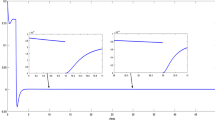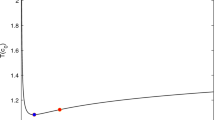Abstract
This paper examines the p-th moment globally asymptotic stability in probability and p-th moment stochastic input-to-state stability for a type of impulsive stochastic system withMarkovian switching. By applying the generalized average dwell time approach, some novel sufficient conditions are obtained to ensure these stability properties. Furthermore, the coefficient of the Lyapunov function is allowed to be time-varying, which generalizes and improves the existing results. As corollaries, nonlinear restrictions on the drift and diffusion coefficients are used as substitutes for some previous conditions. Two examples are provided to illustrate the effectiveness of the theoretical results.
Similar content being viewed by others
References
Sontag E D. Smooth stabilization implies coprime factorization. IEEE Trans Autom Control, 1989, 34: 435–443
Peng S G, Deng F Q. New criteria on pth moment input-to-state stability of impulsive stochastic delayed differential systems. IEEE Trans Autom Control, 2017, 62: 3573–3579
Wu X T, Tang Y, ZhangWB. Input-to-state stability of impulsive stochastic delayed systems under linear assumptions. Automatica, 2016, 66: 195–204
Guo R N, Zhang Z Y, Liu X P, et al. Exponential input-to-state stability for complex-valued memristor-based BAM neural networks with multiple time-varying delays. Neurocomputing, 2018, 275: 2041–2054
Pin G, Parisini T. Networked predictive control of uncertain constrained nonlinear systems: recursive feasibility and input-to-state stability analysis. IEEE Trans Autom Control, 2011, 56: 72–87
Sun F L, Guan Z H, Zhang X H, et al. Exponential-weighted input-to-state stability of hybrid impulsive switched systems. IET Control Theory Appl, 2012, 6: 430–436
Vu L, Chatterjee D, Liberzon D. Input-to-state stability of switched systems and switching adaptive control. Automatica, 2007, 43: 639–646
Wang J. A necessary and sufficient condition for input-to-state stability of quantised feedback systems. Int J Control, 2017, 90: 1846–1860
Liu X M, Yang C Y, Zhou L N. Global asymptotic stability analysis of two-time-scale competitive neural networks with time-varying delays. Neurocomputing, 2018, 273: 357–366
Florchinger P. Global asymptotic stabilisation in probability of nonlinear stochastic systems via passivity. Int J Control, 2016, 89: 1406–1415
Wang B, Zhu Q X. Stability analysis of Markov switched stochastic differential equations with both stable and unstable subsystems. Syst Control Lett, 2017, 105: 55–61
Shen L J, Sun J T. p-th moment exponential stability of stochastic differential equations with impulse effect. Sci China Inf Sci, 2011, 54: 1702–1711
Peng S G, Zhang Y. Razumikhin-type theorems on pth moment exponential stability of impulsive stochastic delay differential equations. IEEE Trans Autom Control, 2010, 55: 1917–1922
Yao F Q, Deng F Q. Stability of impulsive stochastic functional differential systems in terms of two measures via comparison approach. Sci China Inf Sci, 2012, 55: 1313–1322
Wang H L, Ding C M. Impulsive control for differential systems with delay. Math Meth Appl Sci, 2013, 36: 967–973
Jiang F, Yang H, Shen Y. Stability of second-order stochastic neutral partial functional differential equations driven by impulsive noises. Sci China Inf Sci, 2016, 59: 112208
Li X D, Song S J. Stabilization of delay systems: delay-dependent impulsive control. IEEE Trans Autom Control, 2017, 62: 406–411
Sakthivel R, Luo J. Asymptotic stability of nonlinear impulsive stochastic differential equations. Stat Probab Lett, 2009, 79: 1219–1223
Cheng P, Deng F Q, Yao F Q. Exponential stability analysis of impulsive stochastic functional differential systems with delayed impulses. Commun Nonlinear Sci Numer Simul, 2013, 19: 2104-2114
Hespanha J P, Liberzon D, Teel A R. Lyapunov conditions for input-to-state stability of impulsive systems. Automatica, 2008, 44: 2735–2744
Dashkovskiy S, Mironchenko A. Input-to-state stability of nonlinear impulsive systems. SIAM J Control Optim, 2013, 51: 1962–1987
Li X D, Zhang X L, Song S J. Effect of delayed impulses on input-to-state stability of nonlinear systems. Automatica, 2017, 76: 378–382
Yao F Q, Cao J D, Cheng P, et al. Generalized average dwell time approach to stability and input-to-state stability of hybrid impulsive stochastic differential systems. Nonlinear Anal-Hybrid Syst, 2016, 22: 147–160
Zhu Q X, Song S Y, Tang T R. Mean square exponential stability of stochastic nonlinear delay systems. Int J Control, 2017, 90: 2384–2393
Mao X R, Yuan C G. Stochastic Differential Delay Equations with Markovian Switching. London: Imperial College Press, 2006
Zhu Q X, Zhang Q Y. pth moment exponential stabilisation of hybrid stochastic differential equations by feedback controls based on discrete-time state observations with a time delay. IET Control Theory Appl, 2017, 11: 1992–2003
Zhu Q X. Razumikhin-type theorem for stochastic functional differential equations with L´evy noise and Markov switching. Int J Control, 2017, 90: 1703–1712
Zhu EW, Tian X,Wang Y H. On p-th moment exponential stability of stochastic differential equations with Markovian switching and time-varying delay. J Inequal Appl, 2015, 2015: 137
Wu X T, Shi P, Tang Y, et al. Input-to-state stability of nonlinear stochastic time-varying systems with impulsive effects. Int J Robust Nonlinear Control, 2017, 27: 1792–1809
Khasminskii R. Stochastic Stability of Differential Equations. 2nd ed. Berlin: Springer, 2012
Li D Q, Cheng P, He S P. Exponential stability of hybrid stochastic functional differential systems with delayed impulsive effects: average impulsive interval approach. Math Meth Appl Sci, 2017, 40: 4197–4210
Jiang Z P, Teel A R, Praly L. Small-gain theorem for ISS systems and applications. Math Control Signal Syst, 1994, 7: 95–120
Liu J, Liu X Z, Xie W C. Impulsive stabilization of stochastic functional differential equations. Appl Math Lett, 2011, 24: 264–269
Xu L G, Xu D Y. Mean square exponential stability of impulsive control stochastic systems with time-varying delay. Phys Lett A, 2009, 373: 328–333
Liu B. Stability of solutions for stochastic impulsive systems via comparison approach. IEEE Trans Autom Control, 2008, 53: 2128–2133
Ning C Y, He Y, Wu M, et al. Indefinite Lyapunov functions for input-to-state stability of impulsive systems. Inf Sci, 2018, 436: 343–351
Lu J Q, Ho D W C, Cao J D. A unified synchronization criterion for impulsive dynamical networks. Automatica, 2010, 46: 1215–1221
Acknowledgements
This work was jointly supported by National Natural Science Foundation of China (Grant Nos. 61773217, 61374080), Natural Science Foundation of Jiangsu Province (Grant No. BK20161552), Qing Lan Project of Jiangsu Province, and Priority Academic Program Development of Jiangsu Higher Education Institutions.
Author information
Authors and Affiliations
Corresponding author
Rights and permissions
About this article
Cite this article
Fu, X., Zhu, Q. Stability of nonlinear impulsive stochastic systems with Markovian switching under generalized average dwell time condition. Sci. China Inf. Sci. 61, 112211 (2018). https://doi.org/10.1007/s11432-018-9496-6
Received:
Revised:
Accepted:
Published:
DOI: https://doi.org/10.1007/s11432-018-9496-6




